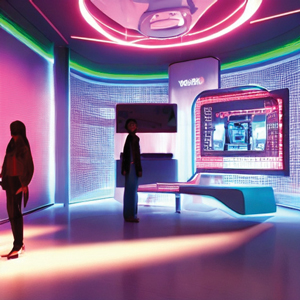THANK YOU FOR SUBSCRIBING

The New Retail Formula: AI Meets Human Expertise
Alessandro Camaioni, UK Strategy Director, Commerce & Experiential, Momentum Worldwide, and Maria Munoz, UK Cultural Strategist, Momentum Worldwide

I magine entering your favourite grocery store, greeted by warm smiles and familiar faces, with knowledgeable store assistants offering personalised recommendations. Now, envision a world where cutting-edge AI technology seamlessly integrates into every aspect of your shopping journey, from tailored promotions to smart AI-driven trolleys that scan and tally items without human touch.
As technology advances, there is a delicate balance to be struck between AI efficiency and preserving the crucial essence of genuine human interactions. Retailers must ensure that, while embracing AI, shoppers themselves are not taken out of the shopping experience they love and value.
It wasn't too long ago when my local C-store owner would keep key products aside for me. Now, the magic of customised deals lies in AI-driven promotion strategies. Leading retailers like Auchan and Lidl harness the power of AI to offer personalised promotions and recipe recommendations based on dietary preferences and purchase history. While this level of personalisation adds convenience and saves money, there is concern about its influence on consumer behaviour, potentially leading to tunnel vision on a limited range of items and brands within the new retail environment.

Moreover, AI has transformed physical store experiences, such as Sainsbury's, which has teamed up with L'Oréal and Garnier to offer in-store AI skincare consultations and try-on counters, elevating convenience to a new level. At Coles in Australia, stores are efficiently managing shelves, ensuring product availability, and offering personalised recommendations and promotional videos to increase conversion likelihood.
Amazon has implemented frictionless AI-powered checkouts like the Smart Cart Amazon Go in the US and Just Walk Out tech in Amazon Fresh in the UK. Although these seamless checkouts offer efficiency, questions arise about whether they allow shoppers to wander and discover beyond their shopping lists or if they may require new ways to engage with brands along their journey.
In the fast-paced retail world, online grocery shopping is a growth priority. Retailers like Aeon and Ocado are in a race to win the delivery service competition, introducing AI-driven online delivery services that navigate through products and recommend items based on prior purchase records. Another added service in the world of online shopping is virtual assistants, like the one at Carrefour.fr, providing instant responses and suggesting personalised products.
While these services enhance efficiency, they also contribute to the elimination of human elements both online and in-store.
Cognizant of this risk, some retailers are trialling ways to bring human elements into the consumer journey, like the slow checkout lanes recently implemented at Jumbo supermarkets in the Netherlands that encourage store attendants to engage in conversations with elderly people because efficiency is not the only need. Unofficially, the world of retail has evolved into social hubs, where small interactions with strangers at the cashier or planned meetups with friends infuse muchneeded human warmth and socialisation into the shopping experience.
As AI becomes more integrated into commerce, there is concern that it may not only replace employees but also take over the role of shoppers, drastically influencing their behaviour. Previously, shoppers used to create lists and enjoy browsing; now, they tend to repeat purchases in near autopilot mode.
This raises the question: are we losing the soul of shopping?
Shoppers still crave a shopping experience, not just a mere groceries transaction. They seek to explore, discover and enjoy the process of shopping beyond just convenience.
The human element encompasses not only shopper assistants but also our own input as buyers. So, to preserve the soul of shopping, retailers need to find a new formula where AI and human elements coexist harmoniously. Here are the three pillars of this equation:
1. Personalisation with Empathy:
While AI can empower staff to provide personalised recommendations, preserving the empathetic human touch is the only way to create a warm and delightful shopping experience—a perfect blend of AI efficiency and personal connection.2. Inspiring Explorations with AI-Creativity:
As shoppers, we desire more than just convenient and familiar products. We crave unique discoveries and the thrill of finding something unexpected. Beyond personalisation and recommendation, why not unleash AI as a creative tool to design captivating displays, product innovation and curated aisles?Retailers Must ensure that, While Embracing AI, Shoppers Themselves are not Taken out of the Shopping Experience They Love and Value
3. Welcoming Social Hub:
Stores remain social spots that foster interactions between customers and staff and among shoppers themselves. Retailers can harness AI to elevate these social experiences, organising events or demonstrations based on customer interests, thereby using their strengths to nurture a sense of community and connection.Retailers can find the perfect harmony between cutting-edge technology and the human touch in retail by embracing these principles and following this innovative approach. Transforming the modern shopping experience into something meaningful and contemporary: a harmonious blend of technology and human connection.
Coauthored by:
Alessandro Camaioni is UK Strategy Director, Commerce & Experiential at Momentum Worldwide. With 15 years of experience in Brand Strategy, Retail Design, and Shopper Marketing, Ale has helped brands connect with, and convert, people across the purchase journey by planning and delivering memorable and meaningful experiences. He has worked across numerous global clients and sectors, including American Express, Unilever, P&G, Kimberly Clark, Diageo, Coca-Cola, Ferrero, General Mills, Sennheiser, Sony and Nikon.
Maria Munoz is UK Cultural Strategist at Momentum Worldwide. Maria's in-depth research and analysis inspire evocative brand strategies, thanks to her firm belief that understanding culture is key to remaining relevant to consumers. Throughout her five years career, she has worked on global brands like Sprite, American Express, Microsoft, General Mills and KitKat.
Weekly Brief
I agree We use cookies on this website to enhance your user experience. By clicking any link on this page you are giving your consent for us to set cookies. More info
Read Also
Navigating Compliance Challenges in ESG AML and Digital Onboarding
A Vision for the Future: Automation, Robotics, and the Smart Factory
The Rise of Hyper Automation
Transforming Business Operations with Robotic Process Automation
Combining Automation with AI to Achieve Human-Like Interaction
Implementing RPA - 5 Ultimate Prerequisite
Incorporating the power of recognition into our vendors' sustainability journey
Elevating Guest Experience with Data




















